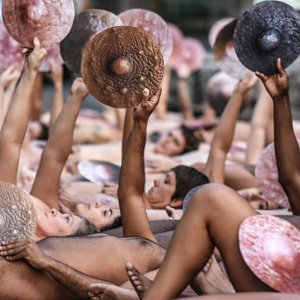Protest, P/performance, and Tragic Aftermath
Both post-colonial and post-Apartheid, contemporary South Africa is often constructed solely in terms of its past.
Despite this, the structural legacies of these extractive and oppressive systems remains urgently, painfully present tense.
Few scripts exist for states of/in aftermath of tragedy, whether formally, on stage, or in everyday life.
Indeed, tragic aftermath is often represented in classical drama as a circular, lost, unmoored and unresolved state of being.
Post-catastrophe, how do people re-form their national or personal narrative?
With the highest GINI coefficient for inequality in the world and an informal estimate over more than a protest a day,
South Africa is popularly dubbed the ‘protest nation’. Against this backdrop, protest can be read as a performative national act,
repeated with ever-increasing urgency in the hopes of escaping a tragic cycle: of poverty, oppression, or abuse.




